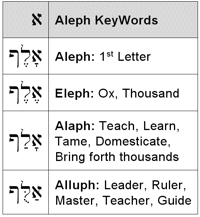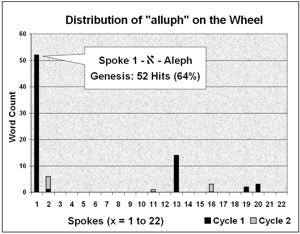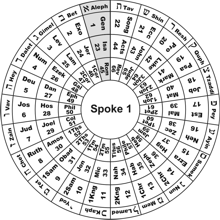God our Leader, Teacher, and Guide
And an highway shall be there, and a way, and it shall be called The way of holiness; the
unclean shall not pass over it; but it shall be for those: the wayfaring men, though fools, shall not err therein.
Isaiah 35:8 (Spoke 1, Cycle 2)

The purpose of the Hebrew Alphabet is contained in the name of its First Letter which
is based on the verb alaph meaning teach or learn in the sense of
"becoming familiar with" or "becoming accustomed to." Elihu used this word when he said
"hearken unto me: hold thy peace,
and I shall teach thee wisdom" (Job 33:33). When applied to animals,
it means tame, train, or domesticate, whence the name of the chief domesticated animal,
ox (eleph), and the form of Aleph in the ancient Hebrew script –  – which was an
image of its horned head. When rotated, it became the Latin and Greek A. The word eleph
also denotes a thousand with its cognate verb alaph meaning to bring forth thousands.
Etymologists trace this to the root idea of connecting or joining, with a herd of oxen evoking the
idea of a multitude, a "thousand." These words appear together in Psalm 144:13f: – which was an
image of its horned head. When rotated, it became the Latin and Greek A. The word eleph
also denotes a thousand with its cognate verb alaph meaning to bring forth thousands.
Etymologists trace this to the root idea of connecting or joining, with a herd of oxen evoking the
idea of a multitude, a "thousand." These words appear together in Psalm 144:13f:
... that our sheep may bring forth thousands (alaph) and ten thousands in
our streets: That our oxen (eleph) may be strong to labour ...
These ideas unite in the word alluph which denotes a master, teacher, guide
or leader of thousands. Jews traditionally use this to refer to Rabbis who have attained
great knowledge of the Torah. God applied it to Himself when he called Israel to return unto Him,
"Wilt thou not from this time cry unto me, My father (Avi), thou art the
guide (alluph) of my youth?" (Jer 3:4).

This link between Aleph, alluph and the KeyWord
Avi (My Father) exemplifies the
latter's meaning as a Hebrew Word Picture (BW book pg 116) and its relation to the First Person
of the Holy Trinity, God the Father, our
ultimate Leader, Teacher, and Guide. In the Bible, alluph generally refers to the leadership
of a father as head of a family or tribe. It is translated thrice as governor in Zechariah.
Its greatest density appears in Genesis in the list of the thirty-two Alluphei Edom
(Dukes of Edom), duke being a Middle English word derived from the Latin dux, denoting a leader,
ruler, or commander. This root appears in many English words such as in-duce (to lead on, urge),
pro-duce (bring forth for display, exhibit), and se-duce (to lead astray). In
the modern Israeli army, the rank of
major general is called alluph. Most modern versions of the Bible translate alluph in these verses as
chief, an exception being the NRSV which translates it as leader of a clan because such were
also called a ruler of thousands. The peak of the distribution of alluph on Spoke 1 reveals the
supernatural integration of Aleph with the structure of the Christian Canon.
The union of all these ideas reveals the character and symbolic meaning of Aleph
as the natural Leader of the Divine Alphabet and governor of the First Spoke
of God’s Wheel. Aleph introduces us to the things of God, teaches us His ways, conducts us along His paths,
and always reminds us of the eternal nature of God our Father (Av). It represents the
Will of God and symbolizes His Unity. He alone is
First, and in Him all things find their beginning.
Next Article: God's Sovereign Will: Aleph in Hebrew Grammar
|



